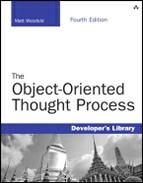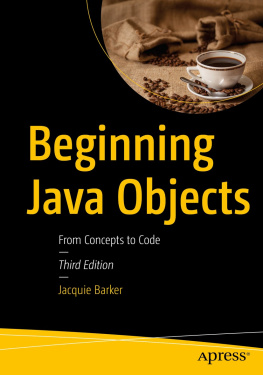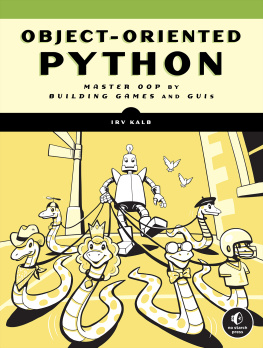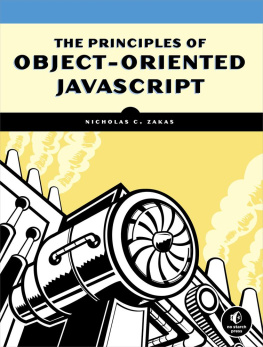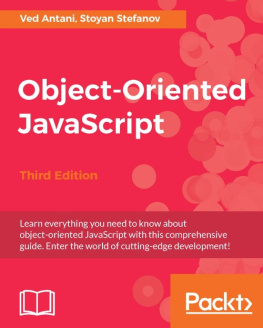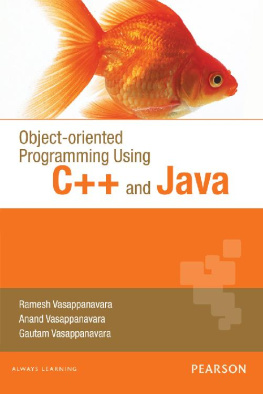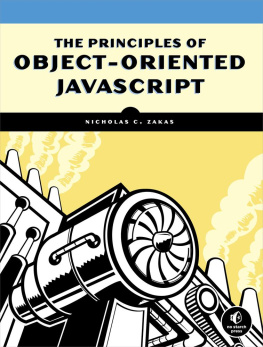Matt Weisfeld - The Object-Oriented Thought Process (4th Edition)
Here you can read online Matt Weisfeld - The Object-Oriented Thought Process (4th Edition) full text of the book (entire story) in english for free. Download pdf and epub, get meaning, cover and reviews about this ebook. year: 2013, publisher: Addison-Wesley Professional, genre: Romance novel. Description of the work, (preface) as well as reviews are available. Best literature library LitArk.com created for fans of good reading and offers a wide selection of genres:
Romance novel
Science fiction
Adventure
Detective
Science
History
Home and family
Prose
Art
Politics
Computer
Non-fiction
Religion
Business
Children
Humor
Choose a favorite category and find really read worthwhile books. Enjoy immersion in the world of imagination, feel the emotions of the characters or learn something new for yourself, make an fascinating discovery.
- Book:The Object-Oriented Thought Process (4th Edition)
- Author:
- Publisher:Addison-Wesley Professional
- Genre:
- Year:2013
- Rating:5 / 5
- Favourites:Add to favourites
- Your mark:
The Object-Oriented Thought Process (4th Edition): summary, description and annotation
We offer to read an annotation, description, summary or preface (depends on what the author of the book "The Object-Oriented Thought Process (4th Edition)" wrote himself). If you haven't found the necessary information about the book — write in the comments, we will try to find it.
The Object-Oriented Thought Process, Fourth Edition
An introduction to object-oriented concepts for developers looking to master modern application practices
Object-oriented programming (OOP) is the foundation of modern programming languages, including C++, Java, C#, Visual Basic .NET, Ruby, and Objective-C. Objects also form the basis for many web technologies such as JavaScript, Python, and PHP.
It is of vital importance to learn the fundamental concepts of object orientation before starting to use object-oriented development environments. OOP promotes good design practices, code portability, and reusebut it requires a shift in thinking to be fully understood. Programmers new to OOP should resist the temptation to jump directly into a particular programming language (such as Objective-C, VB .NET, C++, C# .NET, or Java) or a modeling language (such as UML), and instead first take the time to learn what author Matt Weisfeld calls the object-oriented thought process.
Written by a developer for developers who want to make the leap to object-oriented technologies, The Object-Oriented Thought Process provides a solutions-oriented approach to object-oriented programming. Readers will learn to understand the proper uses of inheritance and composition, the difference between aggregation and association, and the important distinction between interfaces and implementations.
While programming technologies have been changing and evolving over the years, object-oriented concepts remain a constantno matter what the platform. This revised edition focuses on interoperability across programming technologies, whether you are using objects in traditional application design, in XML-based data transactions, in web page development, in mobile apps, or in any modern programming environment.
Programmers who aim to create high quality softwareas all programmers shouldmust learn the varied subtleties of the familiar yet not so familiar beasts called objects and classes. Doing so entails careful study of books such as Matt Weisfelds The Object-Oriented Thought Process.
Bill McCarty, author of Java Distributed Objects, and Object-Oriented Design in Java
Contents at a Glance
1 Introduction to Object-Oriented Concepts
2 How to Think in Terms of Objects
3 Advanced Object-Oriented Concepts
4 The Anatomy of a Class
5 Class Design Guidelines
6 Designing with Objects
7 Mastering Inheritance and Composition
8 Frameworks and Reuse: Designing with Interfaces and Abstract Classes
9 Building Objects and Object-Oriented Design
10 Creating Object Models
11 Objects and Portable Data: XML and JSON
12 Persistent Objects: Serialization, Marshaling, and Relational Databases
13 Objects in Web Services, Mobile Apps, and Hybrids
14 Objects and Client/Server Applications
15 Design Patterns
Matt Weisfeld: author's other books
Who wrote The Object-Oriented Thought Process (4th Edition)? Find out the surname, the name of the author of the book and a list of all author's works by series.

